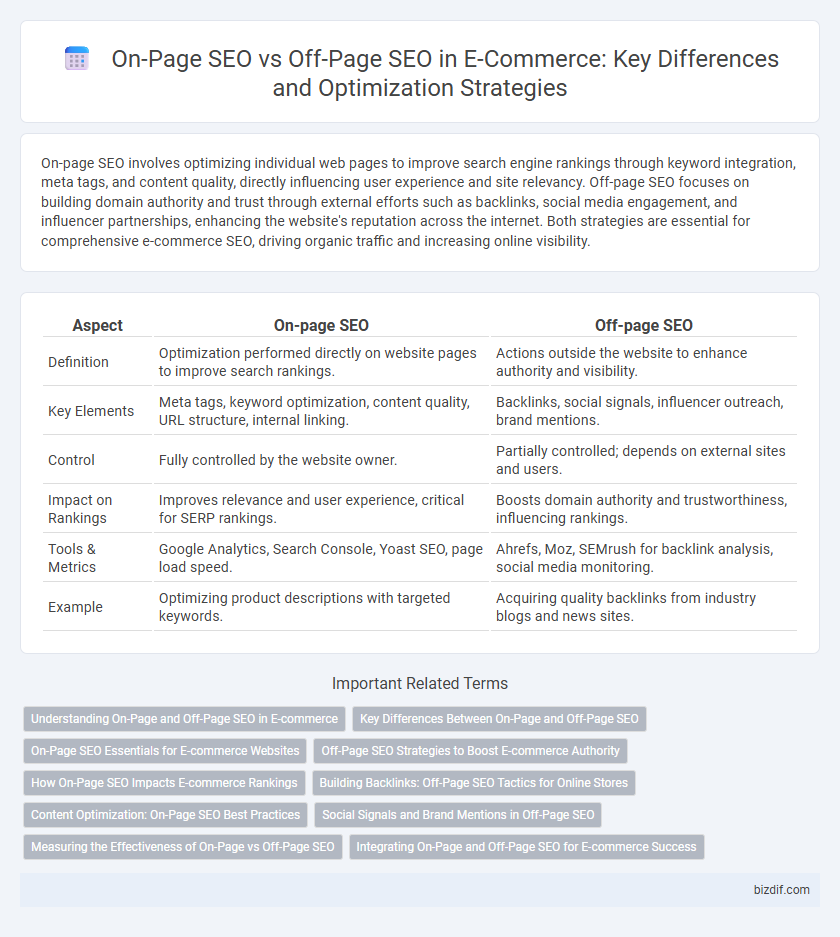On-page SEO involves optimizing individual web pages to improve search engine rankings through keyword integration, meta tags, and content quality, directly influencing user experience and site relevancy. Off-page SEO focuses on building domain authority and trust through external efforts such as backlinks, social media engagement, and influencer partnerships, enhancing the website's reputation across the internet. Both strategies are essential for comprehensive e-commerce SEO, driving organic traffic and increasing online visibility.
Table of Comparison
| Aspect | On-page SEO | Off-page SEO |
|---|---|---|
| Definition | Optimization performed directly on website pages to improve search rankings. | Actions outside the website to enhance authority and visibility. |
| Key Elements | Meta tags, keyword optimization, content quality, URL structure, internal linking. | Backlinks, social signals, influencer outreach, brand mentions. |
| Control | Fully controlled by the website owner. | Partially controlled; depends on external sites and users. |
| Impact on Rankings | Improves relevance and user experience, critical for SERP rankings. | Boosts domain authority and trustworthiness, influencing rankings. |
| Tools & Metrics | Google Analytics, Search Console, Yoast SEO, page load speed. | Ahrefs, Moz, SEMrush for backlink analysis, social media monitoring. |
| Example | Optimizing product descriptions with targeted keywords. | Acquiring quality backlinks from industry blogs and news sites. |
Understanding On-Page and Off-Page SEO in E-commerce
On-page SEO in e-commerce involves optimizing product pages, meta tags, URLs, and content to improve search engine rankings and user experience. Off-page SEO focuses on building domain authority through backlinks, social media engagement, and online reviews, which enhance site credibility and traffic. Both strategies are essential for boosting e-commerce visibility, driving organic traffic, and increasing conversions.
Key Differences Between On-Page and Off-Page SEO
On-page SEO involves optimizing individual e-commerce web pages through keyword integration, meta tags, and site structure to enhance search engine ranking. Off-page SEO focuses on building external signals such as backlinks, social media engagement, and influencer partnerships to increase domain authority. Key differences include control level--on-page SEO is directly managed on the site, while off-page SEO depends on external factors influencing online reputation and visibility.
On-Page SEO Essentials for E-commerce Websites
On-page SEO essentials for e-commerce websites include optimizing product titles, meta descriptions, and URL structures to improve search engine visibility and user experience. High-quality, unique product descriptions with strategically placed keywords enhance relevance and reduce bounce rates, boosting conversion potential. Implementing schema markup for products, optimizing site speed, and ensuring mobile responsiveness directly impact search rankings and customer satisfaction.
Off-Page SEO Strategies to Boost E-commerce Authority
Off-page SEO strategies for e-commerce focus on building high-quality backlinks from authoritative websites, leveraging influencer partnerships, and engaging in social media marketing to increase domain authority and search engine rankings. Customer reviews and user-generated content on external platforms enhance brand credibility and trust, directly impacting off-page SEO effectiveness. Consistent off-page efforts drive organic traffic and improve e-commerce site visibility beyond on-page content optimizations.
How On-Page SEO Impacts E-commerce Rankings
On-page SEO significantly impacts e-commerce rankings by optimizing product descriptions, meta tags, and site structure to enhance search engine crawlability and user experience. Implementing targeted keywords and improving page load speed directly influence organic visibility and reduce bounce rates on e-commerce sites. Proper on-page optimization boosts conversion rates by ensuring product pages align with search intent and customer expectations.
Building Backlinks: Off-Page SEO Tactics for Online Stores
Building backlinks through off-page SEO tactics significantly enhances online store visibility and domain authority, driving organic traffic and improving search engine rankings. Effective strategies include guest blogging on relevant niche sites, influencer collaborations, and participating in industry forums to generate high-quality, authoritative links. Consistent backlink acquisition from reputable sources signals trustworthiness to search engines, crucial for e-commerce success and competitive advantage.
Content Optimization: On-Page SEO Best Practices
Content optimization in e-commerce on-page SEO involves using targeted keywords naturally within product descriptions, meta titles, and headers to improve search engine rankings. Optimizing images with descriptive alt text and ensuring fast page loading enhances user experience and boosts SEO performance. Structured data markup and internal linking help search engines better understand page content and increase visibility in search results.
Social Signals and Brand Mentions in Off-Page SEO
Off-page SEO leverages social signals and brand mentions to boost e-commerce site authority and search engine rankings by increasing online visibility and trust. Social signals from platforms like Facebook, Instagram, and Twitter reflect user engagement and intent, driving organic traffic and enhancing domain credibility. Brand mentions, even without direct backlinks, contribute to reputation management and influence search algorithms by signaling relevance within industry-specific discussions.
Measuring the Effectiveness of On-Page vs Off-Page SEO
Measuring the effectiveness of on-page SEO involves tracking metrics such as page load speed, keyword rankings, bounce rates, and user engagement on product pages, which directly influence search engine visibility. Off-page SEO effectiveness is assessed through backlink quality, domain authority, referral traffic, and social media signals that enhance brand reputation and external credibility. Tools like Google Analytics, SEMrush, and Ahrefs provide comprehensive data to compare how on-page optimizations improve site performance versus how off-page efforts drive organic traffic and authority in e-commerce.
Integrating On-Page and Off-Page SEO for E-commerce Success
Integrating on-page SEO elements such as optimized product descriptions, meta tags, and keyword-rich URLs with off-page SEO strategies like high-quality backlinks and social media engagement significantly boosts e-commerce site visibility. Leveraging both SEO approaches enhances domain authority, improves search engine rankings, and drives targeted organic traffic essential for conversions. Consistent optimization across product pages combined with strategic off-site activities ensures comprehensive SEO performance and sustainable growth for e-commerce businesses.
On-page SEO vs Off-page SEO Infographic

 bizdif.com
bizdif.com